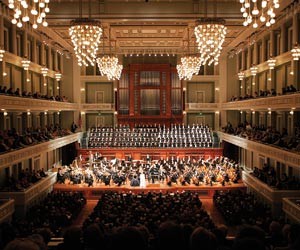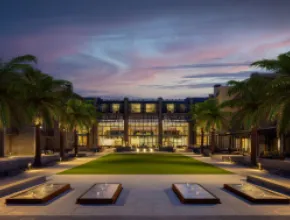As an undisputed bastion of American music and culture—both historic and modern—Tennessee has long held a special place in the hearts of Americans. So when the torrential downpours in late April lead to widespread flooding throughout the state, everyone knew that something sacred to the American identity was in danger. As with New Orleans in 2005, the immediate empathy went to the people who lost their lives and homes, but a secondary level of concern simmered under the surface for the countless historic sites, endless music venues and general music culture infrastructure centered in Nashville and Memphis.
Yet, while Gov. Phil Bredesen has estimated more than $1 billion in damages to the private sector alone, and with 30 deaths from the flooding in Tennessee, Kentucky and Mississippi, the historic hearts and downtown districts of Memphis and Nashville largely withstood the deluge. The city governments have placed a tremendous level of importance on cleaning up so that summer tourism will go on as usual and meetings will remain unaffected.
For planners, this means that with the exception of a handful of businesses and hotels, Central and West Tennessee are open for business as usual.
With its iconic music culture, Southern charm and modern meetings infrastructure—all at second-tier prices—the time is ripe for a meeting in Central and West Tennessee.
Memphis
Memphis, best known to outsiders as the home of rock and roll deity Elvis Presley, was fortunate enough to be largely spared from the flooding, and reports that everything is up and running as usual.
"We are absolutely fine; we came through that unprecedented storm with only minor flooding outside the city," says John Oros, executive vice president and COO of convention development for the Memphis CVB. "No city infrastructure and no convention infrastructure were damaged. We are open for business."
Business as usual in Memphis means music, and lots of it. Not only does the city boast fascinating music history—as a birthplace of both blues and rock and roll—but it remains one of the top music epicenters in the world today. From blues to country to southern rock, the city is home to hundreds of premier musicians, who fill the dozens of downtown venues to capacity when they are not out touring the country. All this makes the city an easy lure to dangle in front of attendees, yet quite amenable to the planner’s needs as well.
"Memphis provides high value for the price, ease of access to many fabulous attractions, a wide variety of restaurants and entertainment for all ages," says Dr. Emmett Winn, executive director of the Southern States Communication Association.
Winn brought a group of 600 to the Memphis Peabody hotel in early April, just before the flooding. While his academic group held their meetings exclusively in the Peabody, they explored the city thoroughly in the off-hours.
"The members enjoyed a wide variety of Memphis’ great attractions, including Graceland, Beale Street and all the wonderful restaurants," Winn says. "Memphis is well situated geographically—easy to drive to and has a lot of nonstop flights in and out during the day."
Winn’s group covered the most popular of the city’s attractions, all of which work well for groups. Graceland, Elvis’ resting place and the feature-rich museum devoted to his legacy, is the state’s top draw, packed with a day’s worth of artifacts and history. Beale Street is where tourists and locals alike come to pop into any number of live music venues, along with countless restaurants and bars.
Memphis is also home to the National Civil Rights Museum, located at the site of the former Lorraine Motel, where Martin Luther King Jr. was assassinated. The museum is much more than a tribute to the slain leader—it provides an engaging and comprehensive history of the turbulent mid-century movement.
The city is about halfway through construction of its considerable Beale Street Landing project, which will result in a docking facility that allows for tour boats to take Beale Street pedestrians out onto the Mississippi River. The project is also expected to include a restaurant and a river park, and is slated for completion in late 2011.
As for meetings, the Memphis Cook Convention Center offers a considerable amount of facilities for the size of the city, with 300,000 square feet of meeting space, including the 2,100-seat Canon Center for the Performing Arts. The center is conveniently attached via covered walkway to the 600-room Memphis Marriott Downtown, and adjacent to the Main Street Trolley Line, with direct access to downtown.
For upscale accommodations, the historic Peabody Hotel is a top choice among planners, with 464 guest rooms and a whopping 80,000 square feet of meeting space. Other meetings favorites include the Hilton Memphis, Westin Memphis Beale Street and Crowne Plaza Memphis. Currently under construction are the new 131-room Courtyard Marriott Hotel and the 125-room Hotel Indigo. Finally, if Graceland does not satiate the Elvis fans in your group, consider putting them up at the memorabilia-filled Heartbreak Hotel.
Nashville
While Memphis was spared from the brunt of the flooding, the state’s capital, Nashville, took more of a beating. The Cumberland River, twisting through the heart of the city, adds considerably to Nashville’s beauty, but when it overflowed it devastated hundreds of homes in the surrounding countryside and caused significant damage downtown. Yet despite television news coverage showing the city submerged after nearly 14 inches of rain fell over two days in early May, the situation has improved dramatically.
"In terms of meetings, we have been busy relocating several of Gaylord Opryland’s groups to other venues within the city," says Kay Witt, senior vice president of sales of the Nashville CVB. "All other hotels are fine, as are most other attractions. We are very lucky."
Aside from the individual homes that were lost, the greatest damage to the tourism sector may have simply been the soaking of thousands of pieces of premium musical instruments kept in the city by top-caliber musicians who call Nashville home, as well as damage to the city’s primary music venue, the Grand Ole Opry, and its top meetings venue, the Gaylord Opryland Hotel and Convention Center (see sidebar, this page). But despite the scattered temporary closures, the bulk of the city’s tourist and meetings infrastructure and attractions are doing just fine. This includes the famous honky-tonk bars downtown, where live music is a constant, the Country Music Hall of Fame and Museum and the Ryman Auditorium, where groups can record their own Nashville-inspired song.
For large meetings, the Downtown Convention Complex is designed to make events as seamless as possible. At the heart of this lies the Nashville Convention Center, with an 118,675-square-foot exhibit hall, 25 meeting rooms and an 11,000-square-foot ballroom. Attached to the complex is the Renaissance Nashville Hotel, and only a few minutes away is Nashville International Airport.
Even the largest meetings will soon be able to visit Nashville, however, when the city finishes the new Music City Center, slated for 2013. The new state-of-the-art facility will double as a world-class performance venue and offer 370,000 square feet of exhibit space and a 60,000-square-foot ballroom with a permanent stage. The center, which is aiming for LEED certification, will also include an adjacent hotel, and details of the brand and size are expected to be released this fall.
The Loveless Barn, which opened last year, offers a unique meeting space of 6,000 square feet, with a full kitchen for on-site catering and beautiful landscaped patios and lawns, ideal for receptions. Also new to Nashville is the environmentally friendly Hutton Hotel, with 248 guest rooms, 13,600 square feet of meeting space and a courtesy hybrid vehicle.
Other top meetings hotels in town include the Hilton Nashville Downtown; Union Station, A Wyndham Historic Hotel; Sheraton Nashville Downtown; The Hermitage Hotel; and Nashville Marriott Airport.
In nearby Williamson County is the Franklin Marriott Cool Springs and adjacent Cool Springs Conference Center.
Jackson
The town of Jackson received its fair share of the flooding as well. Many homes and a few streets were damaged in the deluge but, like the rest of the state, the city quickly rebounded and is up and running as usual. The Jackson CVB reports that there are no closures of any city attractions, hotels or restaurants.
Situated between Memphis and Nashville, Jackson provides groups with a charming and low-key alternative to the city. Aside from its friendly and laid-back atmosphere, one of the biggest draws is the International Rock-A-Billy Hall of Fame and Casey Jones Village, a great choice for a day of entertainment combined with a small on-site meeting or event.
The town also played a major role in the Civil War, and history buffs will want to make a visit to such sites as Britton Lane, Salem Cemetery, Parker’s Crossroads battlefields or Shiloh National Military Park.
Jackson is big on the arts and boasts the Jackson Symphony, a handful of galleries and even more theater venues. Several local wineries promise a day of group bonding, while more than a dozen public parks allow groups to enjoy warm summer days or hold small outdoor events. For larger meetings, planners can consider the Ned R. McWherter West Tennessee Cultural Arts Center, Carl Perkins Civic Center and the Oman Arena.
Hardin County
South of Jackson, Hardin County offers a taste of the rural side of Tennessee, but with major visitor appeal. At the top of the list for groups is Pickwick Landing State Park and Conference Center, which combines meeting space, guest rooms, dining and waterfront recreation all in one.
Meetings can be held in the 7,500-square-foot convention center, with a supporting 109 guest rooms, and the picturesque Pickwick Lake serves as either an inspiring backdrop or an active playground, with plenty of fishing and water recreation options. The Pickwick Belle, an old-fashioned riverboat with daily sailings, is a natural choice for midsize groups seeking a day-trip experience with plenty of bonding opportunities. With a 1,000-seat dining room and regular music performance and sightseeing events, the Pickwick Belle can also be chartered for private events.
Hardin County offers several mid-range hotel options, such as the Savannah Lodge and a Hampton Inn, while very small groups might consider a rental of one of the area’s numerous cabins, which typically provide lake or riverside views and plenty of surrounding nature.
Along with Civil War history, the county is known for its outdoor recreation, from golf to camping to fishing excursions.
Hardin County’s infrastructure was spared from any significant flood damage.
Hunter Holcombe is a freelance writer who covers leisure travel and the meetings, conventions and incentives industry.






